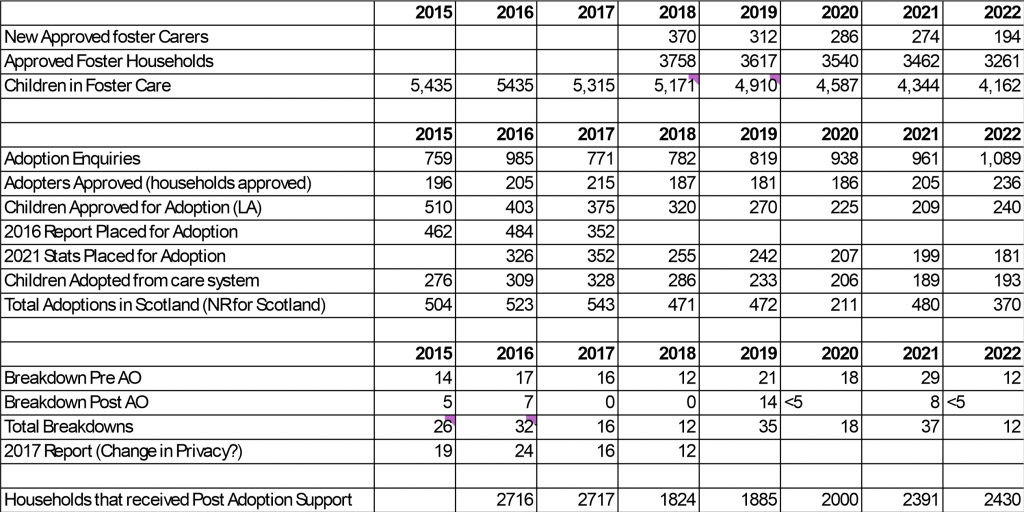“The latest data reveals a 14% increase in children needing an adoptive family compared to 2022-23, with 15% fewer children being placed with adoptive families in the last quarter.”
Adoption Rates in Scotland have been declining, mirroring other areas of the UK. In 2023, the number of children approved for adoption fell by 17.5% compared to the previous year, with only 198 children approved for adoption. Additionally, the number of children placed with adoptive families dropped by 3.9%, and there were fewer new adoptive households approved. These trends reflect a broader downward shift in adoption rates across the country over recent years. Factors contributing to this decline may include changes in the care system, increased use of kinship care, and challenges in matching children with adoptive families.
https://scotlandsadoptionregister.org.uk/adoption-statistics-quarterly-reports/
Extracts From The Care Inspectorate Reports

Source: https://www.careinspectorate.com/index.php/search-publi?q=adoption
Adoption Rates in England
Adoption rates in England have decreased, with 2,960 children adopted in 2022-23, representing a 2% decline compared to the previous year, according to government data. Children with disabilities or behavioral issues face longer waits for adoption, averaging 11 months more than other children, as reported by the Consortium of Voluntary Adoption Agencies (CVAA). This extended wait can negatively impact the emotional development of these children, affecting their self-esteem and ability to focus on education and thriving.
Source: https://cvaa.org.uk/
Adoption Rates Across the UK
Adoption numbers in the UK have been declining since a peak in 2015, partly due to an increase in kinship care placements, improved fertility treatments, and the impact of the cost-of-living crisis, according to the CVAA. As of December 31, 2023, 2,410 children in England were awaiting adoption, a 14% increase from the previous year, according to data from the Coram charity. The CVAA highlights that adoption can provide vulnerable children with life-changing opportunities to thrive that they may not have had otherwise.
What is Kinship Care?
Kinship care in the UK refers to the practice of placing children with relatives or close family friends when their birth parents are unable to care for them. This arrangement can be formal, through legal orders such as special guardianship or child arrangement orders, or informal, without court involvement. Kinship care keeps children within their extended family or community, maintaining important family ties and cultural connections, which are vital for their emotional and psychological well-being. It allows children to stay in a familiar environment, helping them feel more secure and reducing the trauma often associated with being separated from their birth parents. Research shows that children in kinship care generally experience better outcomes than those in foster or institutional care, benefiting from greater stability, a stronger sense of identity, and continuity of care from people they already know and trust.
However, kinship carers in the UK often face challenges such as a lack of financial support and access to services compared to foster carers, which can strain their ability to provide care. Despite these challenges, kinship care remains a preferred option because of its long-term benefits for children’s development and sense of belonging.
https://compass.kinship.org.uk/advice-and-information/what-is-kinship-care/



